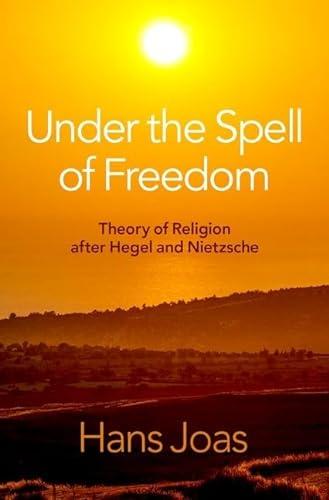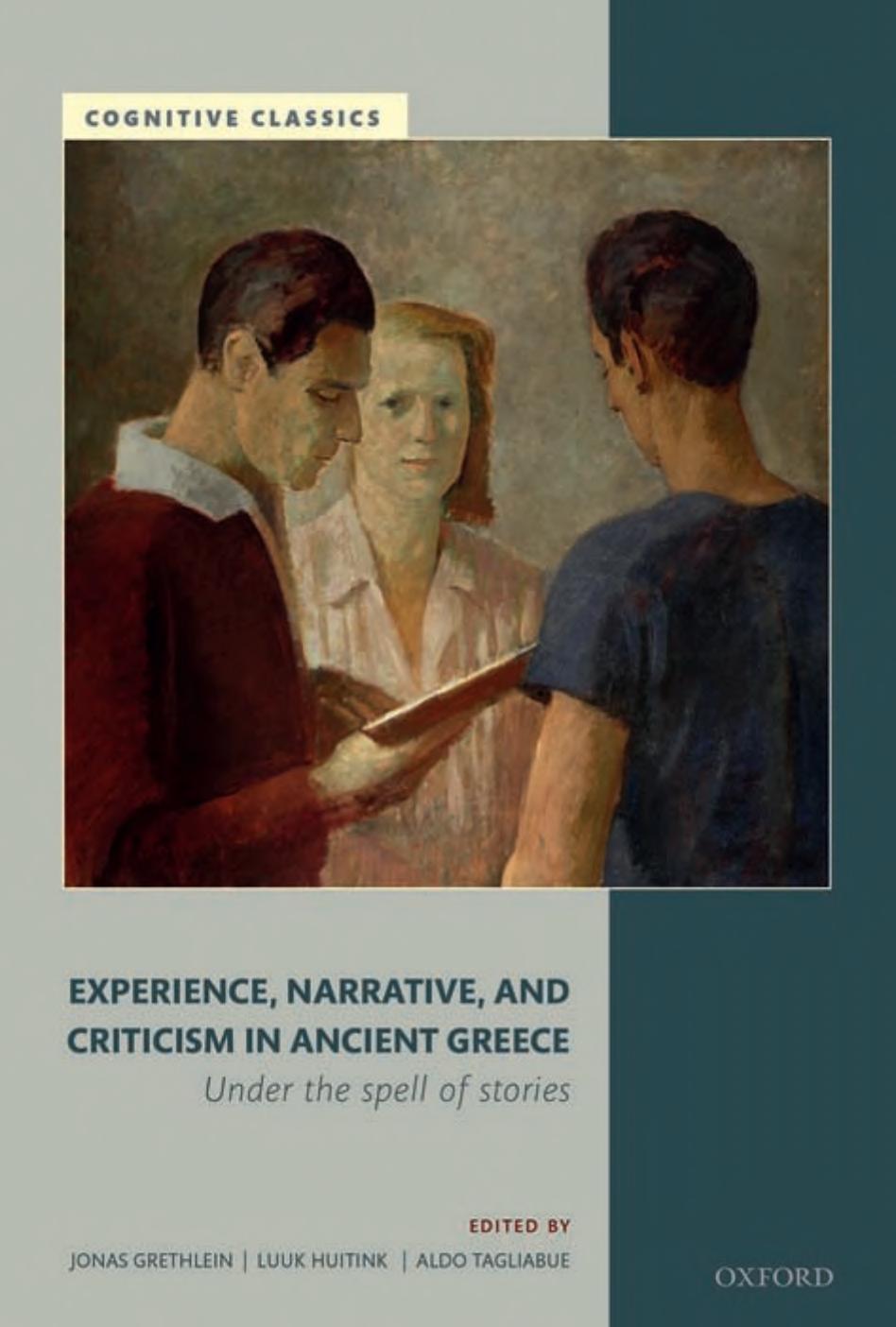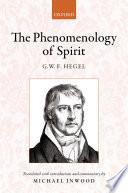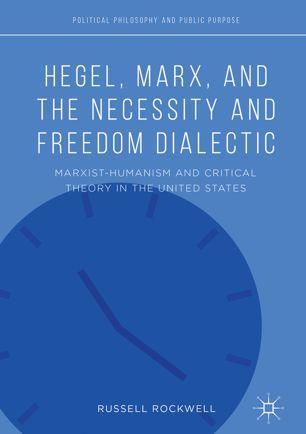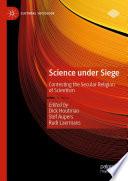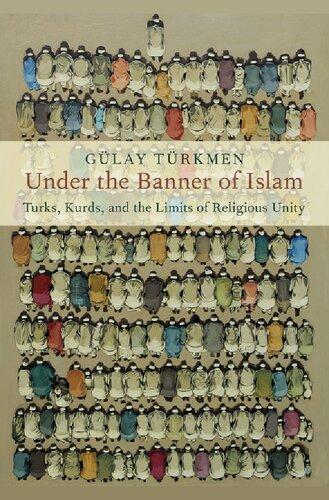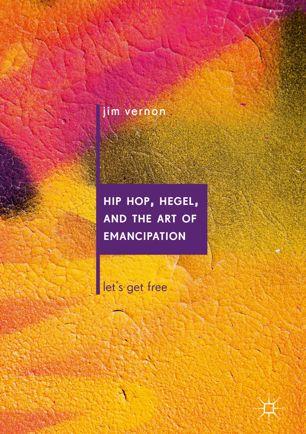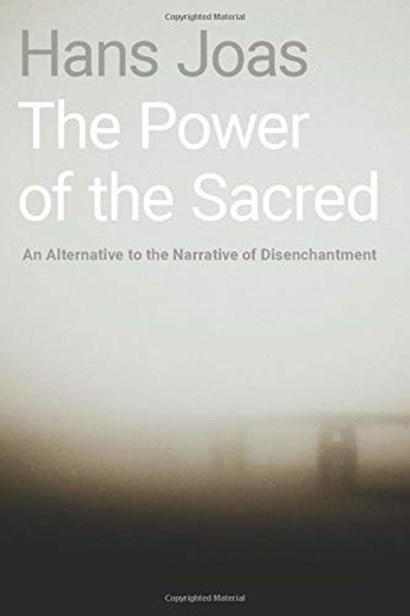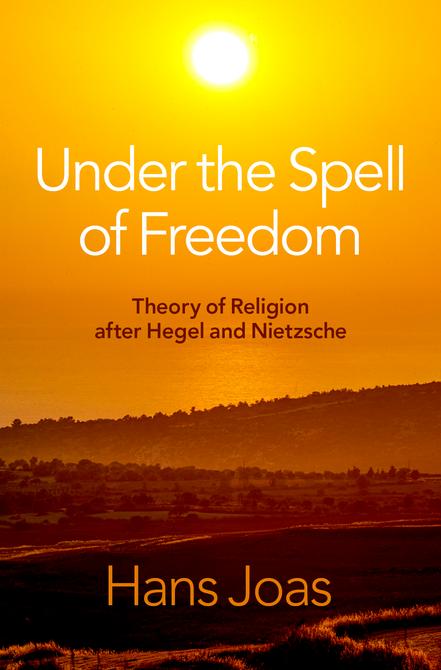Under the Spell of Freedom
Theory of Religion after Hegel and Nietzsche
HANS JOAS
Translated by ALEX SKINNER
Oxford University Press is a department of the University of Oxford. It furthers the University’s objective of excellence in research, scholarship, and education by publishing worldwide. Oxford is a registered trade mark of Oxford University Press in the UK and certain other countries.
Published in the United States of America by Oxford University Press 198 Madison Avenue, New York, NY 10016, United States of America.
© Oxford University Press 2024
All rights reserved. No part of this publication may be reproduced, stored in a retrieval system, or transmitted, in any form or by any means, without the prior permission in writing of Oxford University Press, or as expressly permitted by law, by license, or under terms agreed with the appropriate reproduction rights organization. Inquiries concerning reproduction outside the scope of the above should be sent to the Rights Department, Oxford University Press, at the address above.
You must not circulate this work in any other form and you must impose this same condition on any acquirer.
CIP data is on file at the Library of Congress
ISBN 978–0–19–764215–3
DOI: 10.1093/oso/9780197642153.001.0001
Printed by Integrated Books International, United States of America
For my own part, I doubt whether a man can ever support at the same time complete religious independence and entire public freedom. And I am inclined to think, that if faith be wanting in him, he must serve; and if he be free, he must believe.
Alexis de Tocqueville1
Preface ix
Introduction: Hegel’s Philosophy of Freedom and a Blind Spot in Present-Day Hegelianism 1
PART I. A NEW UNDERSTANDING OF RELIGION IN THE EARLY TWENTIETH CENTURY
1. Introductory Remarks
2. The Independence of Religion: Ernst Troeltsch
3. Secular Sacredness: Rudolf Otto
4. Self-Evidence or Sense of Self-Evidence?: Max Scheler
PART II. S ECULARIZATION
AND THE MODERN HISTORY OF FREEDOM
1.
Sacralization of Democracy: John
3. Post-totalitarian Christianity: Alfred Döblin’s Religious Dialogues
4. The Contingency of Secularization: Reinhart Koselleck’s Theory of History
5. The Secular Option, Its Rise and Consequences: Charles Taylor
PART III. THE SEARCH FOR A DIFFERENT KIND OF FREEDOM
1. Introductory Remarks 163
2. A German Idea of Freedom?: Cassirer and Troeltsch between Germany and the West 173
3. Indebted Freedom: Paul Tillich 196
4. Sieve of Norms and Holy Scripture, Theonomy, and Freedom: Paul Ricœur 215
5. Communicative Freedom and Theology of Liberation: Wolfgang Huber 226
PART IV. THE PROJECT OF A HISTORICAL SOCIOLOGY OF RELIGION
1. Introductory Remarks
2. Religion Is More Than Culture: H.
3. Christianity and the Dangers of Self-Sacralization: Werner Stark 277
4. More Weberian Than Weber?: David Martin
5. Religious Evolution and Symbolic Realism: Robert Bellah
6. Religion and Globalization: José Casanova
Preface
How do the history of religion and the history of political freedom relate to one another? The range of answers to be found within philosophy, the social sciences, and among the general public is vast and defies easy summation. For many, Hegel’s grandiose philosophy-of-history synthesis, which presents us with a teleological development leading to Christianity and through it to political freedom, is still a vital source of orientation, however much it may have been revised in the detail. Even those who build on Hegel in Marxian ways tend to retain key components of this synthesis. For others, Nietzsche’s strident critique of Christianity and his rejection of the modern liberaldemocratic political order, again despite reservations of various kinds, are crucial to their own thinking.
For many years I have sought to formulate an alternative to these modes of thought. In addition to my engagement with American pragmatism, as the philosophical basis of such an alternative, and my books on a general theory of action, the genesis of values, the history of human rights, the history of religion, and war and violence, I have always been on the lookout for more “friends in history” (as the great Confucian philosopher Mencius put it), that is, thinkers of past and present whose writings are an enduring source of inspiration and provide important points of departure for the kind of alternative to Hegel and Nietzsche I have in mind.
The origins of the present book lie in the idea of bringing together the portraits, as I have drawn them over time in scattered writings, of these important twentieth-century and present-day thinkers and scholars who have contributed to the theory of religion, while adding a number of others as well. To avoid giving an impression of randomness, this must involve more than just lining these thinkers up in a row; I seek to show that here we can identify a tradition in its own right. It is in fact clear that these various intellectual approaches not only feature many parallels but also numerous influences and cross-references. In the introduction to this book and in the lead-ins to its four major parts, I tease out the thread—perhaps difficult to discern at first glance—that runs through these different accounts.
The result of these efforts is something halfway between a monograph and a collection of articles. If I may be permitted a literary analogy, we might say that this book is neither a novel nor a mere collection of stories, but rather a novella cycle, though one intended to paint a coherent overall picture.
While there are undoubtedly advantages to this approach, it does come at a certain cost. One of the pros, as I see it, is that what I grapple with here are not pre-schematized arguments corralled into a fictitious system, but individual intellectual “totalities,” together with their historical embeddedness and specific genesis. Apart from anything else, this “holistic” view seems to me well suited to underlining the vitality of these ideas in their specific forms and within their particular intellectual constellations. It may also be a straightforward practical advantage that, as a result, the chapters can be read individually; there is no need to read them in the exact order in which I have arranged them here.
It must be acknowledged, however, that this approach also imposes certain limitations. The most important is that my scattered allusions to an alternative historical narrative are nowhere neatly summarized, not even when I look ahead in the concluding part. This is the task of a future project, for which my books on the “power of the sacred,” the emergence of moral universalism in the so-called Axial Age, and the history of human rights provide the foundation stones. Another disadvantage is that while I examine thinkers and scholars who considered it important that they were neither Hegelians nor Nietzscheans, I do not provide an adequate account of Hegel and Nietzsche in all their own complexity. It is not my goal to add yet another title to the vast interpretative literature on these two thinkers. Instead, I seek to present alternatives to them.
The opportunities and risks entailed in this approach are intertwined. Some will doubt the value of engaging with forgotten or little-known authors, especially since they often worked within the disciplines of theology and sociology, which are at present perceived as sinking ships. Others will sense that in the writings of, for example, Ernst Troeltsch and Paul Tillich, H. Richard Niebuhr and Paul Ricœur, David Martin and Robert Bellah— as well as Charles Taylor, whose work drew heavily on Hegel—we can discern insights that diverge from or go beyond a renewed Hegelianism (or Nietzscheanism). Furthermore, these thinkers influenced each other in notable ways, and their academic careers were often interlinked, reinforcing the impression that it might be justifiable to refer to a concealed tradition here. This can be swiftly illustrated with reference to Paul Tillich, who described
himself as a student of Ernst Troeltsch. Appointed to a post at Frankfurt University in 1928, there he saw himself as the intellectual successor to Max Scheler. He was also strongly influenced by Ernst Cassirer and Rudolf Otto. When Tillich emigrated from Germany to the United States soon after the Nazis took power, H. Richard Niebuhr, who had already translated one of Tillich’s books into English, did much to help him in his new home. Later, at Harvard, Tillich became one of Robert Bellah’s most important academic teachers. Tillich’s successor in his chair at the University of Chicago was Paul Ricœur, who also drew intellectual inspiration from him.
It would be wholly inadequate to think solely in terms of a liberalProtestant tradition in this regard; not all of the Protestant thinkers considered here would feel comfortable with this designation, and it would fail to account for their similarities with non-Protestant authors. Even more important than the interdenominational character of this intellectual development is its interdisciplinary character. To do justice to it, I use the term “theory of religion” in analogy to the increasingly common “social theory.”
The institutional locus of social theory and theory of religion is not a single discipline, not even philosophy or theology. It is precisely at the points of overlap between various disciplines that the developments with which I am concerned in this book have occurred. If this intuition gives rise to new lines of argument, the book’s goal will have been achieved.
In the main, I express my appreciation for suggestions and help in the relevant individual chapters. At this point, though, I would like to thank Torsten Meireis (Berlin) for the opportunity to present certain parts of my manuscript for discussion in his advanced seminar. His comments and those of other participants were particularly useful when it came to reworking the introduction. Meanwhile, and this is worthy of special emphasis, a number of colleagues and friends took on the task of reading the entire manuscript. To them I owe a special debt of gratitude. The same three individuals also provided me with outstanding support to the benefit of the original German version of my book The Power of the Sacred in 2017. Due to the terrible pandemic that affected us all during the final phase of work on the present book, I was unable to listen to their feedback on my first draft in face-to-face meetings. Philosopher Matthias Jung (Koblenz) and sociologist Wolfgang Knöbl (Hamburg) helped me a great deal through their written critiques. Berlin-based theologian (and former Protestant bishop) Wolfgang Huber and I, meanwhile, were unwilling to forgo a spoken exchange. I will never forget our telephone conversation, conducted in quick succession over the
course of three calls and lasting more than eight hours in total, which entailed a blend of substantive debate and thorough work on the text itself.
My work has been generously supported by the Porticus Foundation since 2014 and, since January 1, 2016, by a Max Planck Research Prize, for both of which I am extremely grateful. Thanks are also due to my research assistant Jan Philipp Hahn for his committed and attentive support; to Eva Gilmer, head of the scholarly books program at Suhrkamp Verlag, for encouraging comments and outstanding copyediting; and to Christian Scherer for once again, as so often in the past, making a signal contribution through his superb proofreading and compilation of the index. Finally, as ever, a huge thank-you to my wife, Heidrun, for her intellectual companionship and lifesustaining presence.
Introduction: Hegel’s Philosophy of Freedom and a Blind Spot in Present-Day Hegelianism
This book deals with some of the most important figures in the theory of religion of the twentieth and early twenty-first centuries. Their selection is not based on an antecedent yardstick that might permit us to judge who does or does not deserve to be described as “important.” Instead, my decision to explore the work of a given thinker was made in light of an exploratory survey of intellectual history and the history of scholarship. It was guided by my sense that each of the authors I consider is a leading light who excites current interest when it comes to the questions arising at the intersection of sociology, theology, philosophy, and history (when they grapple with religion in their different ways)—questions explored within these disciplines or in the field of religious studies.
The term “selection” actually sounds too voluntaristic to convey the picture that emerges from this survey. In no way do I seek to achieve encyclopedic completeness, nor do I strive to strike a balance between the confessions or between believers and advocates of secular worldviews. Representatives of religions other than Christianity are absent entirely. Since—as will become apparent— overcoming Eurocentric perspectives is one of the strongest motives underlying the present book, I myself view the lack of non-Western thinkers, Christian or otherwise, as reflecting the most significant limitation to my present state of knowledge. The fact—vital to mention in today’s world—that all the chapters are devoted to male thinkers is, to the best of my knowledge and belief, not due to conscious or unconscious bias in my selection, but to history itself, which cannot be retrospectively corrected. Still, the introductions to the four major parts of the book make reference to other relevant thinkers, with whom I have dealt in detail elsewhere or whose work awaits in-depth exploration.
With regard to the theory of religion, I have already alluded to the existence of areas of overlap between different disciplines, a zone of intersection that
Under the Spell of Freedom. Hans Joas, Oxford University Press. © Oxford University Press 2024.
DOI: 10.1093/oso/9780197642153.003.0001
merits special attention. Once again, this is not a matter of a subjective decision or an abstract preference for interdisciplinarity, as if this were bound to be more effective than a strictly disciplinary approach. Instead, I am guided by the substantive thesis that it has become impossible to discuss religion and the history of religion other than in connection with the normative demands and history of political freedom; after a world-historical phase of increasing globalization whose future trajectories are now a matter of uncertainty, this discussion must be undertaken within a global framework, one not limited to a particular country, continent, civilization, or religious community. This connection between discourses on religion and freedom is signaled in the book’s title. Since the eighteenth century, I would assert, the dialogue on faith has, explicitly or implicitly, come under the “spell of freedom.”
I borrow an expression here that appears in the ambitious blueprint for a theory of justice presented a few years ago by philosopher Axel Honneth.1 This schema essentially sets out to revive and update ideas first developed in substantial form in Hegel’s philosophy of law. Right at the start of the first main section of Honneth’s book we read that it has now become almost impossible to articulate any one of the values of modernity without declaring it merely an ancillary facet of the idea of individual autonomy: “As if by magical attraction, all modern ethical ideals have been placed under the spell of freedom; sometimes they infuse this idea with greater depth or add new accents, but they never manage to posit an independent, stand-alone alternative.”2
In a footnote to this passage, Honneth refers to an argument put forward by Canadian philosopher Charles Taylor that supposedly points in the same direction. This is somewhat perplexing: if we look up the relevant passage,3 Taylor by no means states that the value of freedom has attained indubitable hegemony amid the competition of values, effectively bringing such competition to an end. Instead, Taylor is seeking to characterize modernity by positing an inherently pluralist and differentiated, by no means contradiction-free “package” of value orientations. This, Taylor contends, compels individuals to strike a balance between the values that coexist within this package despite appearing to be mutually exclusive. According to Taylor, then, what is hegemonic is not a specific value, not even that of freedom, but rather “a sense of self defined by the powers of disengaged reason as well as of the creative imagination.” We moderns are all implicated “in the characteristically modern understandings of freedom and dignity and rights, in the ideals of self-fulfilment and expression, and in the demands of universal
benevolence and justice.”4 By no means are we dealing here with mere shadows cast by the ideal of freedom.
Even so, Taylor would presumably not deny that the ideal of freedom is an important component of the “package” of modern values and that all questions of orientation have come under the spell of this complex of values that includes freedom.
The gap between Honneth and Taylor on this point has not gone unnoticed in the critical debate on Honneth’s theory of justice. In a particularly astute contribution, Christoph Halbig goes so far as to state that Taylor drew “exactly the opposite conclusion” as Honneth.5 But even more important than this observation is Halbig’s distinction between three possible readings of the “spell” thesis. In line with my earlier remarks, he states that the primacy of the value of freedom could be meant in a normative sense. In other words, should there, for example, be a conflict between the values of self-determination and equality, we must always opt for freedom in the shape of self-determination. However, he goes on, this primacy might also be envisaged as explanatory, such that “the value of human subjects lies in their capacity for self-determination,”6 though this by no means arises from self-evident moral intuitions. Finally, according to Halbig, this primacy may even be understood ontologically and semantically. This is what must be meant whenever it is stated that all other values of modernity can now only be understood within the framework of the ideal of freedom, as its semantic components, which in principle rules out a genuine conflict between freedom and other values.
This critic’s demonstration of the ambiguity of his spell thesis gave Honneth a chance to clarify things, of which he availed himself in a reply. Here he emphasizes that, in line with the goals of a theory of justice, he is not really concerned with the range of values that individuals regard as guiding their lives, but only with the value “that can be generalized or . . . that falls within the realm of an ‘overlapping consensus,’ so that conclusions can then be drawn about the social or institutional preconditions for a realization of freedom that is equally possible for everyone.”7 This clarification may, of course, be viewed as a retreat to the quasi-orthodox position of a liberal theory of justice, as it appears in John Rawls’s epoch-making oeuvre.8 The primacy of freedom would then be limited to the idea of an institutional guarantee of “spheres of freedom” that “are equally in the interest of all of us, the members of modern societies, regardless of our particular goals of selfrealization.”9 On this premise, the primacy of freedom would pertain only
in the sense of a concept of justice conceived in light of the question of how to ensure equal freedom. This, however, would render Honneth’s Hegelian ambitions incomprehensible.
The confusing argumentational situation arising from Honneth’s contribution thus defies such simple resolution, which would also fail to do justice to his goal of envisaging different versions of freedom and interpreting value conflicts in the public realm as disputes over the correct understanding of freedom. This becomes all the clearer if we include the historical dimension, which is not at all necessary in a justice theory à la Rawls but is indispensable in Hegel. Honneth the Hegelian explicitly adopts a “teleological perspective” in this regard, which he even describes as an “inevitable element of modernity’s self-understanding.”10 Hence, for Honneth, the triumph of the ideal of freedom in “Western Modernity” should not be imagined as a merely contingent and, in principle, reversible product of historical developments, but as a process of asserting universal normative validity. But here the ambiguity of the spell thesis resurfaces. Empirically, we obviously cannot rule out a reversal of the achievements of the history of freedom—as burned indelibly into our memory by the history of the “Third Reich”—and Honneth himself would have no need to pen polemics against “cognitive barbarization” if he considered such a reversal an empirical impossibility.
From the standpoint of those who share a value, there is in fact something inevitable about a teleology that is not meant empirically but purely in a normative sense,11 but this has no empirical explanatory power. And a “semantic” thesis, according to which it would simply make no sense to allow a greater pluralism of values, even at the level of a normative theory of society, than Rawls and Honneth do, cannot be justified by the rapid embrace of a teleology.12 Halbig articulates more sharply still the concern that a narrow focus on the value of freedom might lead to an “impoverishment of moral patterns of reasoning” and to a substantive distortion of alternatives13 a consequence that Honneth surely did not intend. But this is in fact the consequence—as it would appear at this point—if claims are made on the basis of Hegel that are underpinned in the latter’s work by metaphysical background assumptions that Honneth expressly rejects and that virtually no one still seriously espouses. It is the assumption of a “spirit” gradually realizing itself over the course of world history, an assumption very few would now find persuasive, that facilitates a teleological history of freedom and religion. The starting point of my reflections so far is the thesis that the discourse on religion, too, had come under the spell of freedom by the
eighteenth century at the latest. This thesis is ultimately independent of whether it is put forward within the framework of value pluralism or assumes a monistic value of freedom; although this distinction will crop up time and again, it is not decisive in the present context. It is easy to illustrate what the foregrounding (however understood) of freedom in this field can mean. In the associated discussions, religious faith is either decried as an obstacle to political freedom, as a means of maintaining inequality and oppression, or conversely, at least in the form of Christianity or the Judeo- Christian tradition, is defended as crucial to facilitating political freedom. Religious experience itself is perceived by some as one of the most intense experiences of freedom human beings can have and by others as a gross form of heteronomy, the readiness to submit to imaginary powers of fate. One and the same religious tradition can, it is argued, undergird freedom at the level of doctrine, but as a lived practice it may impede individual freedom— for example, through a blinkered morality. Conversely, a religion whose doctrine is inimical to demands for political freedom may prove a source of strength and freedom for people if its religious practice enables certain experiences. In line with this, the ambiguity of the concept of freedom and its status within a broader philosophy and social theory find reflection in a variety of ways in the theory of religion, if it resides under the spell of freedom.
The same goes for the question of how to assess historically the relationship between faith and political freedom. Here, too, the most varied range of views compete in a way that hampers a clear overview.14 Some hope for guidance from the grandest synthesis of the history of religion and history of freedom that Western thought has produced—namely Hegel’s philosophy of history, along with contemporary thinkers’ attempts to revise and update it. As understandable as this is and however obvious a step it may seem to return to Hegel after the loss of credibility suffered by Marxism and particularly its view of religion, I believe it to be a mistake. In fact, as I argue in this book, Hegel’s synthesis itself has proven a dead end for the theory of religion. This synthesis must be questioned in fundamental ways and overcome if we are to resolve the problems arising for religion “under the spell of freedom.” This I seek to do in the different parts of this book and by building on thinkers who have recognized the Hegelian cul-de-sac as such. The main task of this introduction is to adumbrate the key ways in which I undertake to do this. But let us first return briefly to Honneth’s theory of justice from this perspective. This is necessary because it enables us to counter, in exemplary
fashion, the impression that one can safely dispense with the theory of religion in present-day social philosophy and social theory.
The aforementioned philosophical reservations have found interesting parallels and supplements in sociological and theological debates. Through a sociological lens, Wolfgang Knöbl in particular has assailed Honneth’s Hegelian-teleological line of argument for repeatedly sliding from the “normative reconstruction” of past developments into statements that ascribe to ideas themselves, and especially the idea of freedom, a history-shaping power so strong that the latter’s ultimate victory seems inexorable.15 For Knöbl, this is an extreme version of the evolutionist optimism found in the social scientific modernization theory of the 1950s and 1960s, one that supposedly provides a philosophical rationale for an even more extreme optimism about the future. Honneth has responded by limiting his theory’s causal claims more clearly than his book does.16 One of the criticisms made in theological quarters, meanwhile, is of some importance in the present context. In the introduction to his own reflections on the prospect of religious forms that can protect the present-day individual from the alienation induced by programs of self-optimization, Protestant theologian Rolf Schieder simply draws attention to the astonishing fact that “Axel Honneth’s ‘outline of a democratic morality’ [part of the title of the original German version of the book] takes no account either of education or religion as institutions of the reproduction of that morality—and certainly not in light of their mutual interweaving.”17 This, Schieder contends, is all the more remarkable given that Honneth’s book ends with a call for a transnational public sphere that has after all for centuries been prefigured in the “world religions” and the universities.
Honneth’s response to Schieder’s friendly exhortation to plug these obvious gaps in a future volume can only be described as astonishing. He fully admits to having overlooked “entirely the importance of public education to a democratic morality,”18 attributing “this major omission” to a “slavish orientation toward Hegel’s work”; he then criticizes Hegel and highlights his own attempts to improve on him. Yet he fails completely to respond to the other criticism, namely that he had not addressed the topic of religion at all.
Elsewhere in his reply he makes only very indirect and fleeting mention of cultural stimuli that may arise from religion, or of church-based communities as a form of intermediary organization alongside associations and cultural institutions.19 Perhaps more important is his somewhat cryptic statement that he had omitted a planned section of concluding observations because then “an entire chapter on the present-day formation of the ‘absolute
spirit’ [might have been] necessary”:20 in Hegel, of course, this is the systematic locus of the philosophy of religion. We can also read this remark as an expression of respect for the magnitude of the unfinished business involved. But the fact is that this important social-theoretical attempt to bring Hegel up to date not only fails to address the topic of religion but tacitly effaces the hinge points where Hegel’s philosophy of law is bound up with his philosophy of religion and his understanding of religion and history.
It seems to me that the importance of this observation goes well beyond the identification of a thematic lacuna in the work of a single author. The tendency to leave Hegel shorn of his ideas on religion appears in the work of other contemporary Left Hegelians as well. Most important and prominent in this regard is American philosopher Robert Pippin, whose oeuvre has updated the most varied elements of Hegel’s work, from aesthetics to logic, and who—unlike Honneth—also sees a possibility of rescuing Hegel’s metaphysical premises through an ingenious reinterpretation of his logic.21 But even his writings are devoid of references to Hegel and religion or Hegel and Christianity. Pippin’s conception of Hegel is so secularized that he seems to feel no need to reexamine his thought in light of the theory of religion or critique of religion. This is all the more striking, not to say stunning, given that it was precisely Hegel’s philosophy of religion in light of which “the dispute over the systematic validity of his philosophy as a whole was most fiercely fought out,” while their attitude to this systematic validity was “the litmus test for the early Hegel critics and apologists.”22
For Right Hegelians among political philosophers and Protestant theologians, the nexus of Hegel’s philosophy of law and the state on the one hand and his justification of the Christian religion’s claim to absoluteness on the other remained crucial—up to and including the idea of the state as an “earthly God”23 and the future dispensability of the church as an organization of believers different from the state.24 For early Left Hegelians, meanwhile, Hegel’s Christianity formed the major contrast with their own ideas. This they highlighted in critiques of religion and the kind of militant atheist propaganda present in the work of Ludwig Feuerbach, the young Karl Marx, and others, a form of thinking that has made a profound historical impact.
Evidently, today’s Left Hegelians do not identify with these ideas and are keen to avoid being perceived in their vicinity. But this does not mean that they have sought to identify just how their predecessors’ criticism of religion differs from Hegel in order to steer expressly in a different, perhaps less critical direction. They pass over this point in silence, unwilling to endorse either
the critique of religion espoused by the Left Hegelians or the Protestant deification of the state typical of the Right Hegelians who—after Hegel’s death, when, in the discipline of philosophy, Hegelians “became as rare as hen’s teeth and easily came across as rather comical figures”25 maintained his legacy within theology. This is entirely understandable, but it is unproductive in that they have failed to translate it into an explicit revision of Hegel. To be blunt, we might wonder whether, for them, a secularized conception of Hegel is simply a prerequisite for any full-blooded appropriation of his work.
Of course, criticism of individual Hegelians does not amount to a complete picture of present-day scholarship on Hegel and his understanding of religion. My concern here is not with assessing the specialist literature but with systematic contemporary theoretical schemas resting on Hegel’s shoulders. Here we do find studies—particularly those by Charles Taylor and Michael Theunissen—that truly take Hegel’s Christianity seriously.26 But their work too is devoid of any explicit revision of those of Hegel’s assumptions that led to the deification of the state or atheist propaganda among his students. I insist on this point not because I wish to restitute a more Christian Hegel as a major source of theoretical inspiration. On the contrary, I seek to show that the Hegelian route is a dead end in the theory of religion. Rather than continuing along either side of this dead end, what we have to do is depart from it entirely; we need to back up to the point where the wrong turn was taken.
Such a reversal faces tremendous obstacles. It is not only the enormous prestige of Hegel and the whole of German classical philosophy that makes all such attempts appear foolhardy—at least in Germany. One would also have to revise every account that ascribes to nineteenth-century German intellectual history an internal inevitability, which comes across as a systematic conceptual consequence, far beyond cultural peculiarities. Typical of this tendency is Karl Löwith’s brilliant book From Hegel to Nietzsche. 27 Löwith was neither a Hegelian nor a Nietzschean, and in his book he emphasizes not the continuity of but a “revolutionary rupture” within German intellectual history. Yet he still paints a picture that is entirely informed by Germany and that makes Nietzsche’s struggle against every form of latent Christianity and against every half-hearted defense of Christian morality—in the wake of the convulsions that had shaken the Christian faith—appear as the completion of a development begun by Hegel.
When it comes to Christianity, Löwith’s tone is rather melancholy. He is certainly not militantly negative as in Marxism nor does he hysterically celebrate the overcoming of Christianity as a form of liberation in the manner
of the Nietzscheans. Nevertheless, his account has been understood—in the words of Reinhart Koselleck—as a declaration that “there could be no way back, neither back to Christianity, for example in defiance of the new German paganism, nor back to Judaism, from which he saw himself as emancipated, nor even back to classical new humanism, to ‘Goethe.’ ”28 This interpretation is understandable, since Löwith did not contrast the real history of hegemonic thinkers “from Hegel to Nietzsche” with an alternative history, from “Schleiermacher to Troeltsch,” for example. But this reading is also foreshortened: in the little-noticed final paragraph of his great book, Löwith hints, however vaguely, at an alternative:
Since Hegel, and particularly through the work of Marx and Kierkegaard, the Christianity of the bourgeois-Christian world has come to an end. This does not mean that a faith which once conquered the world perishes with its last secular manifestations. For how should the Christian pilgrimage in hoc saeculo ever become homeless in the land where it has never been at home?29
For Löwith, then, no return to Christianity in the form it assumed in the bourgeois world of Germany or Europe does not mean it has no future at all. And no return to Hegel’s Christianity does not mean the faith can only be justified in the form it took in Hegel’s philosophy. Nor does it imply that Christianity loses all justification if this philosophy is over and done with or if its exponents are no longer interested in Hegel’s version of the faith.
Löwith’s historical reconstruction is by no means the only one to exaggerate the inner logic of German intellectual history. It finds parallels in Marxist and Enlightenment-minded reconstructions that analyze German thought from the vantage point of the emergence of Nazism and its prehistory.30 The monumental work on the history of philosophy recently produced by Jürgen Habermas also suffers from its presupposition that the decisive crossroads lies between Hume and Kant. As Habermas sees it, the former gives rise only to a reductionist naturalism, while all that can emerge from the latter are forms of a philosophy of morality and history that can at most be understood as heirs to Christianity but not as articulations of it.31
So, is anyone wishing to free themselves from this predicament on a hiding to nothing? Are we faced here with a quixotism, with the inability to grasp that something has died out and will not be coming back? For my part, such self-doubt would be stronger if the “exploratory survey of intellectual history
and the history of scholarship” to which I referred at the start of the introduction did not provide a wealth of starting points for the development of an alternative to Hegel’s narrative of the history of religion and the history of political freedom. I will be providing a detailed account of these starting points in the various chapters of this book. In advance of these in-depth treatments, I now put forward a set of simplified theses to highlight only the most important differences from Hegel, though not in the form of detailed interpretations of him. At the end of the day, what matters at this point is not whether Hegel thought this or that or whether he expressed different ideas in other parts of his oeuvre. More important are the assertions that have taken on a life of their own vis-à-vis their originator, that have, as such, become influential and amenable to discussion.32 Still, these assertions are expressed in their classic form in his writings, however far the later cultural-Protestant historical narrative may have moved away from him.33 Hegel’s influential mode of thought is most accessible not in the short final part of his Elements of the Philosophy of Right (§§ 341–360), the most important relevant passage in the writings he himself had published, but in the lectures on the philosophy of world history that he held every other year at the University of Berlin, from the winter semester of 1822–1823 until shortly before his death in 1831, in other words a total of five times, which have come down to us in the shape of various transcripts and the publications based on them.34
Following detailed reflections on the possible “methods of treating history,” these lectures set out the main elements of Hegel’s philosophical conceptions of “spirit” and its realization in history along with his ideas on the course of world history, before elucidating empirically (after a fashion) the geographical foundations of world history. The main part provides a more detailed account of the “Oriental,” Greek, Roman, and Germanic worlds in four lengthy sections. Crucially, these different cultural “worlds” are not simply juxtaposed, examined to identify possible mutual influences and scrutinized with respect to their developmental potential. Instead, they are arranged into a value-based hierarchical order, for which Hegel goes so far as to deploy the metaphor of ages in the life of humankind. These worlds he views as stages in a single world-historical process, one through which an idea inherent in the history of humankind is gradually realized. This idea is that of “freedom.” Hegel thus interprets history as a whole as the history of the self-realization of the spirit, as the history of the advancing self-knowledge of divine reason.
As easy as it is to find Hegelian articulations of this basic idea, and as common as these may be in philosophical circles, from a certain distance it is far from easy to state exactly what this means. At present, the easiest term to use is “self-realization,” as it expresses an ideal that is extremely influential today, a specifically “expressive” conception of freedom.35 On closer reflection, a strange paradox quickly becomes apparent in this term, because it is quite unclear what constitutes this self before it is realized, that is, what sort of reality we might ascribe to the unrealized self. But this conceptual problem has not stopped the triumphal march of the ideal of self-realization in “Western” culture and beyond. Yet what is meant here is only ever the selfrealization of individuals, or collectives in a few cases, but not that of the “spirit.”
Hegel himself seems to have been the first to use the term “self-realization” philosophically,36 and the term “spirit” is of course central to his mature thinking. But only later thinkers, writing in Hegel’s wake, worked with the notion of the “self-realization of the spirit.”37 What is already hard to grasp with respect to individuals is all the more mysterious when applied to this “spirit.” In the course of his oeuvre, Hegel relied more and more on this concept, which was supposed to enable him to move beyond the mere contrasting of ideal and reality. If ideals are themselves a product of historical developments, it was vital to include this fact self-reflectively in every observation on history and morality. This opened up the prospect of conceiving of the development of ideals themselves as a tiered developmental process through which, as in the process of individuals’ formation, self-realization takes place. However, traits are ascribed to this “spirit” as well as to “reason” that are hard to imagine beyond individuals and their relationships with one another, except in a religious sense.38 In Hegel, then, “spirit” and “reason” have unmistakable attributes of the divine, which renders understandable the transition to the idea that these entities play an active role in the world.
Like the “living God” of Christianity, it is possible to conceive of an “absolute spirit.” This intellectual move is, however, of the profoundest “ambiguity”39 as far as the Christian faith is concerned. It is unclear whether this entails abandoning Christianity in the traditional sense or justifying it in a new way through the philosophy of history. This ambiguity is also clearly evident when Hegel limits religions, including Christianity, to the sphere of feeling and (mere) imagination, compared to which only conceptual thought—in the shape of philosophy—can help what is merely felt and intuited in religion to assume its full form.
This picture, sketched in bare outline, already shows how difficult it is to resist the pull of the Hegelian conceptual apparatus if one wishes to explain his thinking. It is no accident, then, that the language used in many attempts to build on Hegel sounds like that of the master himself. As I see it, however, we are faced with a fundamental hermeneutical problem if a thinker’s ideas are conveyed solely in his own terminology—in Hegel’s case, moreover, one invented by the thinker himself. It is precisely the key forks in Hegel’s conceptual path that this approach fails to bring out. If a thinker’s concepts cannot be formulated or are extremely difficult to formulate in a language other than his own, this should not be taken as an indication of their unsurpassable profundity, but as the sign of a problem requiring resolution.
The basic outline of Hegel’s philosophy of history thus consists of a conception of “spirit” that differs from (unspiritual) nature and, in constant struggle with its previous forms of realization, strives to go beyond them until it has found its own appropriate form of realization, that is, until it has realized itself. This is the foundation underlying the edifice of Hegel’s philosophy of history, which, while working through a sizeable quantity of contemporary knowledge, traces the major historical stages in the emergence of the state as a form of the positive realization of freedom, first in the “Orient,” then in the emergence of ideas on the freedom of the citizen (and only of the citizen) in the Greek world and subsequently in the unrestricted freedom that takes wing in the Roman world, the “place of birth” of the Christian religion.40 In the history of Christianity, for Hegel the German Lutheran, it is then “the German nations”41 that contribute decisively to the historical development of this freedom, and it is the Reformation in particular that restores the Christian understanding of freedom in all its purity vis-à-vis the aberrations of the Middle Ages, while exercising a formative effect on the (early modern) state. Enlightenment and revolution, Hegel explains, then give rise to the political phenomenon of the freedom-guaranteeing state, which finds its historically highest and ultimate form in Prussia in the wake of the reforms implemented in response to its defeat at the hands of the Napoleonic army. In his Lectures on the Philosophy of History, Hegel’s systematic philosophy thus takes the form of a grand narrative that has rightly been called the “great epic of European modernity.”42
Since Hegel’s time, polemical critiques have repudiated this great epic and even held it up to ridicule in the most varied range of ways. Not all the objections raised are equally important to my argument here. The present book concentrates on what I consider to be four key issues, giving
rise to its four-part structure: (1) the criticism that Hegel suffers from an intellectualistic understanding of religious faith; (2) the questioning of Hegel’s ideas about the connection between religion and political freedom, here chiefly in light of what occurred in the eras after Hegel, especially the twentieth century; (3) new impulses that can shape our understanding of freedom in a way that leads beyond Hegel; and finally (4), overcoming Hegel’s Eurocentric and Christianity-centric understanding of world history. Taken together, these four aspects are intended to demonstrate the validity of my claim of a Hegelian dead end in the theory of religion.
(1) The assertion of an intellectualistic understanding of faith in Hegel’s work may seem unjustified at first sight. In his early work—and especially compared to Kant’s moralistically attenuated conception of faith—Hegel did take into account the dimensions of feeling, intuition, and imagination. In the Phenomenology of Spirit, however, as already recognizable in the book’s basic architecture, he leaves us in no doubt that there must be an “absolute knowledge” that is higher than the spirit even of revealed religion. For Hegel, not only must faith not remain at this preconceptual level. For him it is crucial that such preconceptual subjective religiosity is—in and of itself—open to content of any kind. This is the systematic point at which, regardless of the personal dimensions of their relationship, Hegel and Schleiermacher differed radically. If Schleiermacher defined religion by means of a feeling, namely that of “absolute dependency,” then for Hegel this was wholly inadequate. In a famous jibe, Hegel remarked that a dog must be the best Christian because it lives with a constant feeling of dependency on its master, while the receipt of a bone triggers “feelings of redemption.”43
What sounds like a masterful rebuff, however, simply fails to do justice to Schleiermacher’s sophisticated understanding of faith. The latter therefore consciously refrained from responding publicly to Hegel’s statement. There is a difference, one that must surely have mattered to Hegel, between a person capable of freedom recognizing themselves, in all their self-confident freedom, as absolutely dependent, and a dog perpetually limited by its natural dependence. The key question is whether, in religious feeling or, as it was to be expressed by later thinkers, in religious experience, certain cognitive content is always present in such a way that it can and must be articulated, in which case there can be no question of feeling or experience being random vis-à-vis their forms of articulation. Also crucial, however, is how we envisage the limits to conceptual articulation. The understanding of such limits strips this articulation of any notion of self-evident superiority to other
symbol systems, underlining that it is always in some measure also one-sided and impoverishing.44 Here we touch on critical issues relating to the interpretation of Hegel and, above all, to the anthropological foundations of the theory of religion. This is why the present book repeatedly airs the prospect of a different understanding of human corporeality than that inherent in the conception of “spirit.”
(2) The claim that Hegel’s ideas make a poor fit with the experiences of the twentieth century may also seem trivial or unfair at first sight. Yet ultimately it is quite reasonable to critically review a comprehensive reconstruction of world history in light of later developments. The Prussian constitutional state may have been unsurpassed in Hegel’s time in normative terms (though who would now seriously espouse this idea, however critical a view they might take of France, Britain, or Austria at the time?). But the later course of history, and in particular the totalitarianisms of the twentieth century, must surely prompt us to rethink any confidence in the securely established nature of political freedom. Prussian-German history and Christianity’s entanglements with it are in fact a striking example of why this is necessary. This rethinking raises fundamental doubts about the future-focused, prognostic value of a teleological reconstruction of history. It turns history from a great supra-personal process back into a contingent one, in which the future depends in significant part on action in the present, on situationally apt and morally imperative actions under conditions that are never entirely controllable.
While Hegel’s philosophy is an expression of the radical temporalization and historicization that began in the eighteenth century, this approach immediately rigidifies again if history as a whole is thought of as a single necessary process and the phases of the past are envisaged as stages in an identifiable development. This turns contingency into a surface phenomenon by which the philosopher must not allow themself to be distracted as they contemplate historical necessity. On this premise, they do not talk about history as a whole in bold and risky statements that may be refuted empirically and practically through confrontation with events. Instead, they adopt the tone of a (second-rate) theology of revelation, the pretense of having certain knowledge of past, present, and future and of the ultimate purpose of world history. Here, too, Hegel’s ambiguity with regard to secularization, as highlighted by Karl Löwith, is palpable. What appears from one perspective as the dissolution of belief in divine reason and the embrace of a purely mundane world history turns out to be, from a different vantage point, a sacralization of
reason, which is articulated with all the fervor of the true believer certain of their salvation.45
(3) The question has repeatedly been raised, not least among Hegelians themselves, of the extent to which Hegel’s conception of freedom does justice to the intersubjective perspective inherent in his philosophy. In a general sense, this question need not interest us here. But it touches on Hegel’s conception of political freedom in that it reveals a highly ambivalent relationship to the idea of the public sphere. In his early work The Structural Transformation of the Public Sphere, Jürgen Habermas already highlighted the illiberal statism that prevails in Hegel’s work in this regard; in line with this, the moment Axel Honneth turns to the democratic public sphere in his theory of justice, he expressly distances himself from the model of Hegel’s philosophy of law, from which he otherwise takes his lead.46 This suggests that we might need to understand freedom differently than Hegel did at least when it comes to religion in the public sphere—in other words, public religion. On this premise, there is no getting away from the fact that the search for an appropriate understanding of public religion will also have an impact on one’s understanding of faith as a whole.
This brings out the problematic nature of simple ideas about Christianity as such or even about Protestantism as such and their respective effects in history. Different believers and different religious groups will relate their faith to politics or politics to their faith in different ways. Controversies and influences will arise beyond the boundaries of religious communities. Specifically with reference to Hegel, one of the things this means is that his anti-Catholicism requires revision. However we may now assess Catholicism in Hegel’s day, we are left with the impression of an undifferentiated and static judgment that points to underlying problems. I believe the origins of these problems lie in an exaggerated notion of the autonomy of reason and in a failure to consider the idea of “indebted freedom.” What then emerges is that only an even more pragmatic and hermeneutical conception of reason than that found in Hegel and an even more consistent relativization of the ideal of self-determination, through reflection on its constitution, are compatible with the ideals of political freedom. Part III of this book does not, therefore, present a break with Hegel, but seeks to further develop themes that are already present in his work, but were only developed consistently after him.
(4) No one today would seriously dispute that Hegel’s philosophy of history is Eurocentric to its core. The introduction to one of the pioneering works of modern global historiography laments the belief, imparted by schools, that
the West has a genealogy “according to which ancient Greece begat Rome, Rome begat Christian Europe, Christian Europe begat the Renaissance, the Renaissance the Enlightenment and the Enlightenment political democracy and the industrial revolution.”47 Such a scheme of historical development, we are informed, is misleading for two reasons. It transforms history into a “race in time in which each runner of the race passes on the torch of liberty to the next relay,” which leads to a “tale about the furtherance of virtue” that enables the winners of history to view themselves as vehicles for the achievement of moral objectives. At the same time, interest in history is reduced to a concern with the “precursor(s) of the final apotheosis”48 instead of sensitizing us to the true conflicts and developmental possibilities of history.
If the Renaissance were replaced by the Reformation and the reference to democracy and the industrial revolution removed, these statements could have been aimed at Hegel. This is because, in taking up and carrying forward the historiography of his time, Hegel composed an epic that spawned a particular stylistic tradition. Though modified in the detail, its basic structure endured in the work of later thinkers. Tellingly, Hegel deals with pre- or anti-state societies in his introductory observations on “geographical foundations” because, it would appear, he is unwilling to dignify them with their own history. For Hegel, history begins with the state and writing, and history in this sense (allegedly) starts with China. But what he has to say about China is marked by a profound denigration of its traditions, both state and religious. Hegel’s view is centered on ahistorical patriarchal despotism, undergirded by a religion, Confucianism, that he thinks embodies the opposite of the idea of freedom.49 India too is depicted as completely ossified in its caste system and thus as captive of fundamental social inequality.
While it would be wrong to condemn Hegel for the views and knowledge gaps characteristic of his time, in this case he was not simply a victim of prevailing prejudices but contributed significantly to the “disenchantment of Asia.” Hegel played a major role in confining “the world-historical importance of Asiatic civilizations to their distant past,”50 and he endorsed the European subjugation of Asia. Without blinking an eyelid, he predicted that China, too, would “some day or other, be obliged to submit to this fate.”51 So although it would be unfair to make excessive empirical demands of grand philosophical schemas, we should not pretend that a philosophy remains untouched by the deficient assessments of reality that entered into it or are based on it.
My concern here is with more than just correcting specific statements. I seek to question Hegel’s philosophy of history in a crucial respect. What I have in mind is the same point that exercised Ernst Troeltsch when, in relation to the history of Christianity, he drew on Ranke rather than Hegel.52 Ranke’s often-sneered-at statement that every era is immediate to God is described by Troeltsch as profound because it teaches us not to view eras simply as stages in a development that realizes an ideal, but as independent attempts to realize ideals that are, however, never fully realized and to whose unrealized aspirations we must always react anew in our own particular circumstances. This means we not only have to break with Hegel’s Eurocentrism, but also with the idea that Christianity is the absolute religion. Distancing ourselves from Hegel’s philosophy of history points to the need to adopt a humbler relationship to Christianity and a more curious and openminded relationship to other religions; it also highlights the need to adopt a critical distance to secularist Hegelians’ tendency to transfer Hegel’s salvific certainty to their own secular worldviews.
Schleiermacher and Ranke are in fact two of the thinkers who had to admit defeat in the face of Hegel’s overpowering influence, but who gained the upper hand in the subsequent history of the humanities. Of course, this description does not apply to philosophy, in which, to this day, the great theologian and the great historian tend not to be taken very seriously.53 The present book, however, does not focus on these scholars, whose lifetimes overlapped with that of Hegel, as alternatives to him, but rather on later thinkers who referred to Hegel from a historical distance when they formulated their alternatives, or who simply ignored him. They were mostly influenced by a changed intellectual atmosphere, in which Hegel’s impact had been supplanted or eclipsed by Nietzsche’s provocations. And many of them contributed to overcoming the Eurocentric view of the history of religion, a process initiated in rudimentary form in the work of Schopenhauer, among others, but that only really bore fruit in the twentieth century.
My reference to Nietzsche’s provocations here is deliberately ambiguous. On the one hand, what I have in mind is the overly polemical tone of Nietzsche’s critique of Christianity, which is often quite understandable as a reaction to certain suffered forms of this religion, but whose untenable generalization and excessively harsh formulation can sometimes be repellent. On the other hand, I am thinking of the profound intellectual challenges emanating from Nietzsche, which became a productive force propelling a new understanding of history and morality as well as Christianity. While
